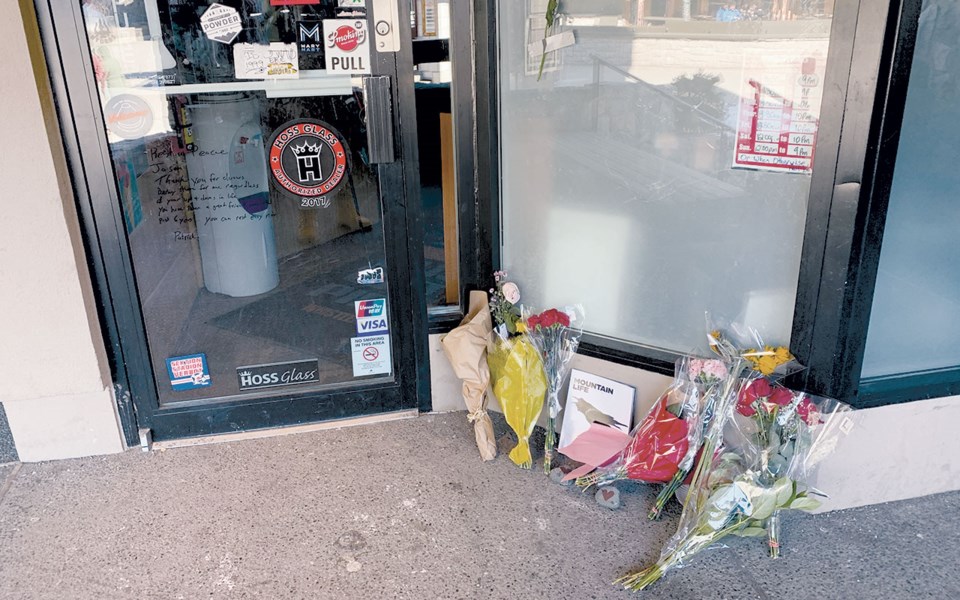A jury has returned with recommendations as part of a coroner’s inquest into the police-involved death of Whistler business owner Jason Koehler, who was tasered, pepper sprayed and struck while resisting arrest in a 2020 incident in Whistler Village.
Koehler, 47, who owned smoking accessories shop 2 Guys with Pipes, died March 8, 2020 after police were called to respond to a disturbance at Stonesedge Kitchen on the Village Stroll. Officers reportedly struggled to control Koehler, who resisted arrest, and over the course of the incident, deployed a taser six times, as well as using pepper spray, batons, and physical blows to subdue him, according to a 2021 independent investigation that cleared the RCMP of any wrongdoing.
A coroner ruled Koehler’s death as accidental, caused by the combined effects of cocaine and methamphetamine toxicity, dilated cardiomyopathy, and struggle during physical restraint.
A coroner’s inquest is mandatory for any death that occurs while a person is detained by or in the custody of a peace officer, and where the public has an interest in being informed. While juries can make recommendations aimed at preventing deaths under similar circumstances, coroner’s inquests are not intended to find legal responsibility or express any conclusion of law.
Following nearly two weeks of testimony in Burnaby Coroners’ Court, the jury came back with eight recommendations for health officials, the RCMP, and the Resort Municipality of Whistler (RMOW). The first recommendation called on B.C.’s health minister and Vancouver Coastal Health to increase community-based mental-health resources, including “case workers working collaboratively with federal and provincial corrections and community groups.”
In a notice of civil claim filed in June 2020, Koehler’s family said he had a history of mental-health issues that had previously brought him into contact with police.
Five recommendations were directed at the commanding officer of the RCMP’s “E” Division. One called for Mounties to evaluate the feasibility of “standalone and in-person training regarding civil liberties, mental health, and de-escalation tactics” for all police officers.
In the same 2020 notice of civil claim, Koehler’s family alleged the first three attending officers resorted to the use of physical force “with limited efforts to de-escalating the situation and no reason to believe bodily harm to anyone was imminent.” In addition to using excessive force, the claim also alleged that a fourth officer arrived on the scene and made “a poorly handled situation substantially worse by acting with malice or gross negligence,” and along with the other officers, continued to use force “long after it should have been clear that such force was unnecessary.”
RCMP officers are trained to use its Incident Management Intervention Model to assess and manage risk in encounters with the public. In September, the federal agency said it was updating the model to assess current training standards on the use of force and to review de-escalation training across Canada.
Another jury recommendation asked police to study the feasibility of counselling and psychological evaluation, fully funded by the RCMP, for police officers after major incidents before going back to active duty.
The Burnaby court heard this month how it took some time for investigators from the Independent Investigation Office of B.C. (IIO), the civilian watchdog that cleared RCMP of any wrongdoing in Koehler’s death, to reach one of the involved officers for questioning after they had taken leave from work following Koehler’s death.
The jury also recommended Whistler RCMP evaluate the Car 99 program, an initiative that sees a nurse practitioner accompany an officer on proactive calls and check-ups, and the feasibility of expanding it to seven days a week.
Another recommendation asked Mounties to ensure all police cars are equipped with automatic external defibrillators. An autopsy noted Koehler had an enlarged heart, and dilated cardiomyopathy, a condition that causes the heart’s chambers to enlarge and weaken, was listed as a contributing cause in his death.
The final recommendation for police was to consider updating its software “for easy access to pictures of any persons of interest.” According to the 2021 IIO investigation into Koehler’s death, the encounter soon grew physical after Koehler reportedly “snatched” an ID from an officer’s hand.
In a statement, the RCMP said it "respects the Coroner's Inquest process and participates fully in those related to in-custody deaths involving the RCMP. Where recommendations are made by the Coroner, the RCMP will conduct a thorough review of those recommendations to determine any implications as well as how best to undertake implementation, if necessary. In some cases, our own internal review may result in similar recommendations which are either already implemented or in progress by the time the Inquest occurs."
The last two recommendations were for Whistler’s local government. The first called on the RMOW to evaluate better points of entry for emergency vehicles to access various areas of the village. The final recommendation asked the municipality to consider placing “sufficient” automatic external defibrillators around the village.
"We have been advised of these recommendations and are taking them very seriously. It is important to evaluate and consider where changes may be warranted to improve safety within the municipality," said a municipal communications official in a statement.
Regarding access to the village, "we currently have numerous access points which were required during the development of the Village," the statement went on. "We continue to ensure that ongoing planning and design support public safety throughout the Village neighbourhood. We also work closely with Vail and other partners to review, optimize, and update movement in the Village area, including access/egress points."
There are currently 25 AED units throughout Whistler, nine of which are in the village itself, the RMOW said. There has not yet been an analysis as to whether this number is sufficient.
The court heard from more than a dozen witnesses over the course of the inquest, including Koehler’s mother, a local emergency physician, a toxicologist, an investigator with the IIO, and a use-of-force instructor from the Vancouver Police Department.





